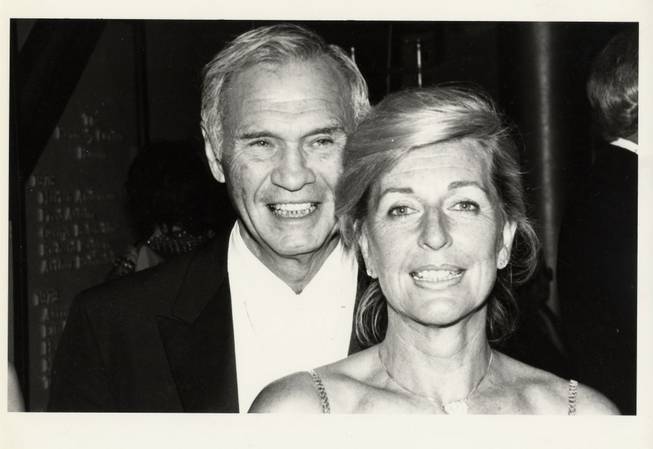
Hank and Barbara Greenspun are shown in this undated photo. Barbara, the matriarch of the Greenspun family, died Tuesday at the age of 88.
Published Tuesday, June 1, 2010 | 6:43 p.m.
Updated Tuesday, June 1, 2010 | 11:41 p.m.
Remembering Barbara Greenspun
Barbara Greenspun, matriarch of the Greenspun family, died Tuesday. Her son and editor of the Las Vegas Sun, Brian Greenspun remembers his mother and her legacy of contributions to the Las Vegas Valley.
Barbara Greenspun: 1922-2010
1922: Barbara Joan Ritchie born in London, Feb. 17. She was the lone daughter of a movie executive.
1944: Barbara and Hank married in Belfast nine days before he left to go to war.
1946: The couple moved to Las Vegas, which Barbara bemoaned as "so barren, so desolate."
1950: Hank purchased the Las Vegas Free Press and renamed it the Las Vegas Sun.
1953: Barbara helped form KLAS Channel 8, the valley's first television station.
1970: The couple helped found the city's first cable television company, now operated by Cox Communications.
1974: Barbara and Hank developed the area's first master-planned community, Green Valley.
1989: With Hank's death, Barbara became publisher of the Sun.
2010: Surrounded by her family, Barbara died in her Las Vegas home of complications from old age.
Barbara's columns
- Barbara Greenspun remembers 1986: Watergate’s lessons haven’t been forgotten (3-16-2001)
- Barbara Greenspun remembers 1968: Uphill battle was worth the effort (11-10-2000)
- Barbara Greenspun remembers 1966: Dandolos was polite, gentle (10-27-2000)
- Barbara Greenspun remembers 1963: Fire was a traumatic experience (10-6-2000)
Sun Archives
- At UNLV, building a ‘monument to forward thinking’ (12-3-2008)
- Brian Greenspun gives his mom the second-best gift ever (5-18-2008)
- Conscience of the community (5-15-2008)
- Greenspun inducted into UNLV honor society (4-27-2006)
- Sun pledges to uphold ideals of founder (10-3-2005)
- Anti-Defamation League honors Sun publisher (5-27-2005)
- Business leaders inducted into Nevada Hall of Fame (2-18-2005)
- Columnist Elizabeth Foyt: Summer camp program celebrates 35th birthday (9-29-2004)
- Greenspun family pledges up to $12 mil. to UNLV (3-5-2002)
- Where I Stand — Brian Greenspun: A mother’s dedication (8-23-2000)
- Barbara Greenspun: Unsung strength (7-1-2000)
- Greenspun Foundation donates $3 million to women’s health center (1-27-1999)
In 1950, when Hank Greenspun purchased the fledgling newspaper he would turn into the daily Las Vegas Sun, his wife, Barbara, was more than just a little bit concerned with his decision and his timing.
“I said, ‘Oh no, not a newspaper — not with all that we have on our plate,’ ” she recalled 50 years later. “He put $1,000 down to buy it, and we didn’t have $1,000 back then. We didn’t have any money.”
The Greenspuns had just lost a bundle in Hank’s first local publication, Las Vegas Life magazine. He had quit his most recent full-time job as publicity director for gangster Benjamin “Bugsy” Siegel’s Flamingo Hotel.
And Hank, a World War II hero, had just been indicted by the federal government for shipping guns to the Middle East to help the Jewish state of Israel defend itself against the Arab armies, which attacked it following the United Nations’ partition in 1948.
Through it all, his wife not only stood by him, she actively helped.
Despite her concerns that the paper would face a rocky road to survival, Barbara got involved in the publication from Day One. She went to the office every day, learning everything she could about the business and, without experience in such things, gracefully charmed business owners to buy ads and pay up on past-due accounts.
It was Barbara’s quiet, behind-the-scenes work, coupled with Hank’s robust crusades against power abusers, that was credited not only with the Sun’s survival in lean times but also for laying the foundation that last year culminated in the Sun being awarded the most prestigious of Pulitzer Prizes, the Gold Medal for Public Service.
Barbara Ritchie Greenspun, the spiritual leader of the Sun and advocate for Israel and Jewish causes, higher education, women’s health and family and community welfare, died Tuesday at her Las Vegas home with her family at her bedside. She was 88, succumbing to the complications of old age.
Services for the Las Vegas resident of 63 years will be conducted at 3 p.m. Thursday at Congregation Ner Tamid.
“In addition to being a longtime friend, Barbara Greenspun was an inspiring woman whose passion for her family and friends was matched only by her dedication to journalism and public service,” Senate Majority Leader Harry Reid said. “Barbara met Hank Greenspun during World War II and has been the family’s rock ever since. My thoughts go out to the entire Greenspun family during this difficult time.”
Barbara’s oldest son, Brian, said Tuesday, “As for enduring legacies, my mother would claim that her family is her legacy. We know what she believed and have learned what she taught, and she will expect us to continue, just as she would if she were here.
“My mother’s insistence on continuing Hank’s legacy — which was running the Las Vegas Sun in the community interest — never wavered,” he said. “Whether it was the Youth Forum, the Sun Camp Fund or a hard-hitting story that adversely affected our friends, she remained consistent. Whatever was best for this community is what the newspaper and her family did.”
Rep. Shelley Berkley, D-Nev., described Barbara as “easily the most remarkable woman I had ever met.”
“When I was growing up in Las Vegas, the Greenspun family was larger than life,” Berkley said. “Barbara was a remarkably elegant, beautiful and classy woman. As I got older and got to know her, it only deepened my appreciation for who she was, what she had done and of her importance to the community.”
Thalia Dondero, a former member of the Nevada System of Higher Education Board of Regents and a former Clark County commissioner, said Barbara “always worked to make the community a better place. She was always there to help. She and Hank were good citizens.”
Las Vegas businessman Art Marshall, a former member of the Nevada Gaming Commission, said:
“Barbara set an example of courage, leadership, generosity and philanthropy. Whenever there was a fundraiser, Barbara was there to lead with her gift, whether it was in easy or hard times for the Greenspuns. When Hank and Barbara came here, they were not wealthy by any stretch of the imagination.
“There are a couple of ways people who are not rich react to getting rich. Sometimes the bad get worse and the good get better. The more successful Barbara became, the more giving she became. And she raised her family to follow her example and do good things. She is a great example of a strong woman.”
Barbara Greenspun long served as the Sun’s treasurer and, in the late 1980s, when he was diagnosed with cancer, Hank Greenspun appointed his wife of 45 years co-publisher of the newspaper. When he died in 1989, she became publisher, a post she held until her death.
In a 2000 interview for the Sun’s 50th anniversary, Barbara Greenspun recalled the paper’s early, lean times.
“We constantly needed to raise money to meet payroll, even though everyone worked for peanuts,” she said. “We would collect $5 here and $10 there from advertisers, and we managed.
“Back in those early days, we were all in the same boat — us and our advertisers. We helped each other. When they didn’t have money to pay us, we ran their ads. When we needed the money to buy newsprint, they would come through for us.”
Longtime advertisers, interviewed for the 50th anniversary issue, recalled how Barbara used her grace and charm to not only collect on accounts receivable, but also persuade them to buy new advertising. One advertiser describer her as “so charming he could never turn her down. ... (She was) the most beautiful bill collector in the world.”
In his autobiography, “Where I Stand,” Hank described his wife as “a zealous combination proofreader, bookkeeper, and bill collector who worked for love rather than money.”
Barbara downplayed her contributions to the paper. She long maintained that she was happy to stand backstage while her husband landed in the national spotlight for his battles against political demagogues such as U.S. Sens. Pat McCarran of Nevada and Joe McCarthy.
“I was perfectly content with that role,” Barbara said in 2000. “I never wanted anything more.”
When she joined her husband as a member of the Nevada Press Association’s Newspaper Hall of Fame in 2004, she spoke of the Sun’s role in Southern Nevada.
When the couple launched the Sun, “We did not do so to win any honors or awards,” Barbara told the gathering. “We did it because the Las Vegas community needed an independent, fair-minded newspaper. Nothing has changed in the last half century.
“I am pleased to be a Hall of Famer, but I am happier that the Las Vegas Sun is still Southern Nevada’s independent and fair-minded newspaper.”
Barbara was a proud, strong, athletic woman who attacked life and sought victories with the same — if not more — fervor than her husband.
Whether she was playing 18 holes of golf — her passion — or a spirited round of bridge, Barbara was an aggressive and formidable force.
“Only a fool plays to lose,” Barbara had said. “I always play to win.”
Nowhere was her competitive spirit more evident than in May 1970 when she outbid casino moguls Jay Sarno and Harold Smith for an Apollo 12 moon mission American flag at an American Cancer Society charity event.
After making what was the highest bid of the entire auction — $25,000 — Greenspun was congratulated by the event’s master of ceremonies, actor John Wayne, who that year won the Academy Award for best actor for the film “True Grit.”
“I love that flag,” Barbara said.
Thanks to her four children, Barbara said then, she was confident the Sun, the moon mission flag and, indeed, her legacy were in good hands.
The children have become community leaders in their own right: Brian Greenspun is president and editor of the Sun and chairman of The Greenspun Corporation; Daniel Greenspun is president of the Greenspun Media Group and vice president of the Sun; Susan Fine has served on the Anti-Defamation League Board; and Jane Gale is involved with numerous charities and is an animal-rights activist.
“Growing up with our mother was very exciting, because of our parents’ community and political involvement, but at the same time very quiet, which was due to our mother’s insistence that children should have manners sufficient enough to visit the Queen,” the daughters said Tuesday in a statement. “She was most emphatic about the way we acted in public and at home. And we grew up knowing that the way we acted reflected directly on our parents.”
Over the past seven decades — and particularly since her husband’s death — Barbara became every bit the community and business leader her husband was.
Barbara, who was raised Jewish in Ireland, devoted herself to Jewish causes and shared with her husband a great desire to see the state of Israel come to life in the late 1940s. At that time, Hank shipped guns to the Jewish state, making him an enduring hero in Israel but a criminal suspect in the United States. The government charged him with violating the Neutrality Act.
In his 1966 book “Where I Stand,” Hank recalled telling his wife about the pending court action and how he was sorry for what she and their family were about to be put through. Barbara responded: “Sorry? Don’t ever say that again. I’m proud of you and everything you’ve done. Whatever happens in that courtroom, I’ll shout it from the housetops so that everyone will know how I feel about Hank Greenspun.”
She steadfastly stood at her husband’s side during the trial in Los Angeles, when he was found guilty. U.S. District Judge Peirson Hall refused to send Hank to prison and instead fined him $10,000. He later was pardoned by President John F. Kennedy.
Barbara went on to serve on the national board of the Simon Wiesenthal Center, was a longtime supporter of the Hebrew University in Jerusalem, was a life member of Hadassah and was a member of Congregation Ner Tamid.
For her lifetime of work for the preservation of Israel and other community causes, Barbara in 2005 received the Anti-Defamation League’s most prestigious honor, the Americanism Award, at its annual dinner at Caesars Palace. Prior to that, she was a recipient of the Judah L. Magnes Gold Medal from Hebrew University.
Education was dear to her. She co-founded with her late husband UNLV’s Greenspun College of Urban Affairs, which now includes the Hank Greenspun School of Journalism and Media Studies.
She also was a member of the UNLV Foundation board of trustees and, in 1991, was named a Distinguished Nevadan by the University and Community College System of Nevada. Seven years later she was given an honorary doctorate of Humane Letters by UNLV.
Since 1994, The Barbara Greenspun Lecture Series at UNLV has brought to town prominent speakers, including journalists Linda Ellerbee and Carl Bernstein and former President Bill Clinton.
Barbara’s contribution to child and family services included serving as a founding member of the Las Vegas Sun Summer Camp Fund, which every year sends to camp as many as 1,000 children who otherwise would not have the opportunity, and as a driving force behind the Sun Youth Forum for high school juniors and seniors. A Henderson junior high school is named for Barbara and Hank Greenspun.
She also served as a member of the Clark County Juvenile Board, was a former longtime member of the United Way of Southern Nevada and was a director of the Greenspun Family Foundation, which is a benefactor to education, the arts and other worthy causes.
Barbara served on the state acupuncture board for 10 years, helping establish that profession in Nevada. She also served on the Advisory Committee of the Governor’s Conference on Women. The Barbara Greenspun Women’s Care Center of Excellence promotes health education and preventive screenings.
In addition to publishing the Sun, Barbara helped launch the valley’s first television station, KLAS Channel 8, in 1953, and helped found the city’s first cable television company, now operated by Cox Communications, in 1970.
In 1974, the Greenspuns formed the American Nevada Company, which developed the first master-planned community in Southern Nevada, the 8,400-acre Green Valley development in Henderson.
Also, she was a patron of the arts, including the Nevada Ballet Theatre and local music and cultural groups.
Born Barbara Joan Ritchie in London on Feb. 17, 1922, she was the lone daughter of a motion picture company executive and his wife. Barbara and her three brothers were raised in Ireland. The family moved to Belfast when the three boys enlisted in the British military.
At a wedding there, she met a brash young officer and lawyer from New York, and it was love at first sight. Just nine days before Hank Greenspun shipped out in 1944, they were married.
Hank Greenspun came to Las Vegas in September 1946 and moved his family here shortly afterward.
He wrote in his autobiography of his adopted city, “I guess it was love at first sight, something akin to the feeling that hit me when I first looked at Barbara. I reacted in typical fashion with a sudden, instinctive reaction.”
Barbara was not as enamored, recalling in the Sun’s 50th anniversary edition in 2000, “It was just awful — so barren, so desolate.” But, she said, she grew to love the city.
“Las Vegas, of course, became a wonderful community,” she said. “If Hank and I in some small way helped to make it a better place, then I am happy about that.”
Barbara’s foray into journalism was helping her husband found and edit Las Vegas Life in the late 1940s.
Before purchasing the Sun, Hank went to work at the newly built Flamingo Hotel as publicity director for Siegel. Hank and Barbara sat at the table next to Siegel and his girlfriend, Virginia Hill, on opening night at the resort in December 1946.
Hank had been introduced to Siegel by Las Vegas Review-Journal Managing Director Al Cahlan. Hank was at the Review-Journal plant printing an issue of his Las Vegas Life when Cahlan asked him to come into his office and meet Siegel. After Siegel was killed in Hill’s mansion in Beverly Hills on June 20, 1947, Hank invested in the Desert Inn and also opened a local radio station.
A short time later, he was approached by the union pressmen who had started the Las Vegas Free Press newspaper after being locked out of the Review-Journal by Cahlan because of their organizing activities.
Hank obtained a $104,000 bank loan to purchase the newspaper from the Indianapolis-based International Typographical Union.
The pressures of starting a family and a business were exacerbated by the trying living conditions in the desert community of the mid-20th century.
“The summers were brutal — we didn’t have air conditioners, just swamp coolers,” Barbara said in 2000. “We lived in an apartment in Boulder City because there was a housing shortage in Las Vegas. There was a drunk who lived in the apartment above us who used to throw furniture out his window. Coyotes ate out of our garbage.”
In the paper’s early days, Hank stood up to Sen. McCarran, who ran the state’s political machine — and not always in the best interest of the public. McCarran ordered local resorts to pull their ads from the Sun in an effort to silence the paper from exposing his backroom deals. It did not work, but the loss of revenue hurt, Barbara recalled.
“That boycott was perhaps our worst time,” she said. “But some of the advertisers, like Benny Binion at the Horseshoe and Wilbur Clark at the Desert Inn, stood by us. They’d run ads like ‘for the benefit of the Red Cross,’ and things like that. It was instrumental in our survival.”
Hank Greenspun’s journalistic crusades kept the newspaper’s attorneys busy battling libel lawsuits that, even when he won, were costly in legal fees and time lost.
His wife, meanwhile, took the financial reins of the paper’s operation to not only finance Hank’s court battles, but also pay for staff, newsprint and other necessities to keep the paper afloat.
In a July 8, 2004, letter of support for Barbara Greenspun’s nomination to the Nevada Newspaper Hall of Fame, then-Sun Managing Editor Michael J. Kelley wrote: “Barbara’s quiet persuasion complemented Hank’s business acumen and helped the newspaper survive both a 1952 advertising boycott by the Strip’s resorts and a fire that leveled the plant in 1963.
“More importantly, her determination kept the Sun alive after Hank’s death ... and has ensured that his hard-charging spirit thrives at the newspaper (20) years after his death.”
For the past six years, Barbara’s role at the paper was limited because of health issues. Despite her painful struggles, she appeared at important company events, inspiring those who worked for — and admired — her.
Last year, Barbara shared in the crowning jewel of her newspaper’s rise to world prominence when the Las Vegas Sun was awarded the Pulitzer Prize for Public Service for its investigation of construction deaths on the Las Vegas Strip and the failures of government, management and labor unions to protect workers.
Barbara Greenspun is survived by daughters Susan Fine and Jane Gale, and her husband, Jeff; sons, Daniel Greenspun and his wife, Robin, and Brian Greenspun and his wife, Myra, all of Las Vegas; 10 grandchildren, Jeffrey Fine, Alyson Marmur, Jonathan Fine, Katie Ehrman, James Greenspun, Moira Tarmy, Jesse Gale, Ariel Gale, Harrison Gale and Amy Arenson; and eight great-grandchildren.
Retired Sun reporter Mary Manning contributed to this story. Donations can be made in Barbara’s memory to the Las Vegas Sun Summer Camp Fund.
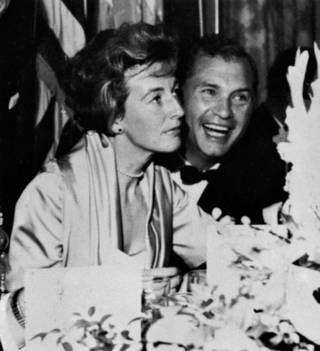
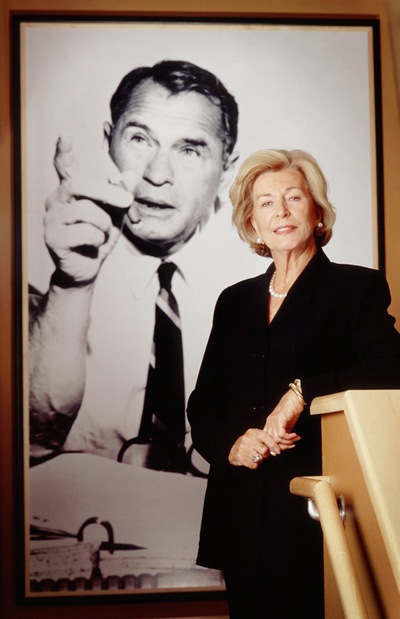
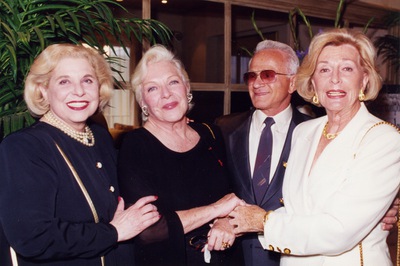
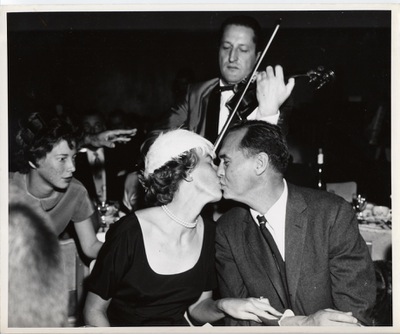
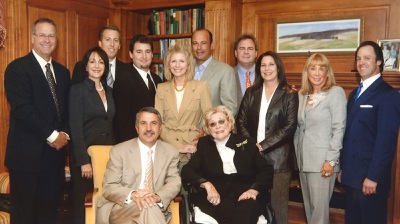
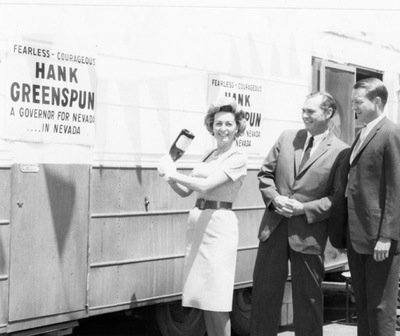

Join the Discussion:
Check this out for a full explanation of our conversion to the LiveFyre commenting system and instructions on how to sign up for an account.
Full comments policy